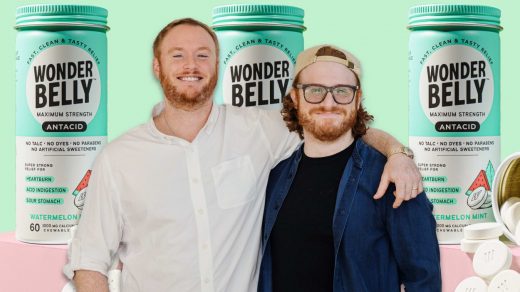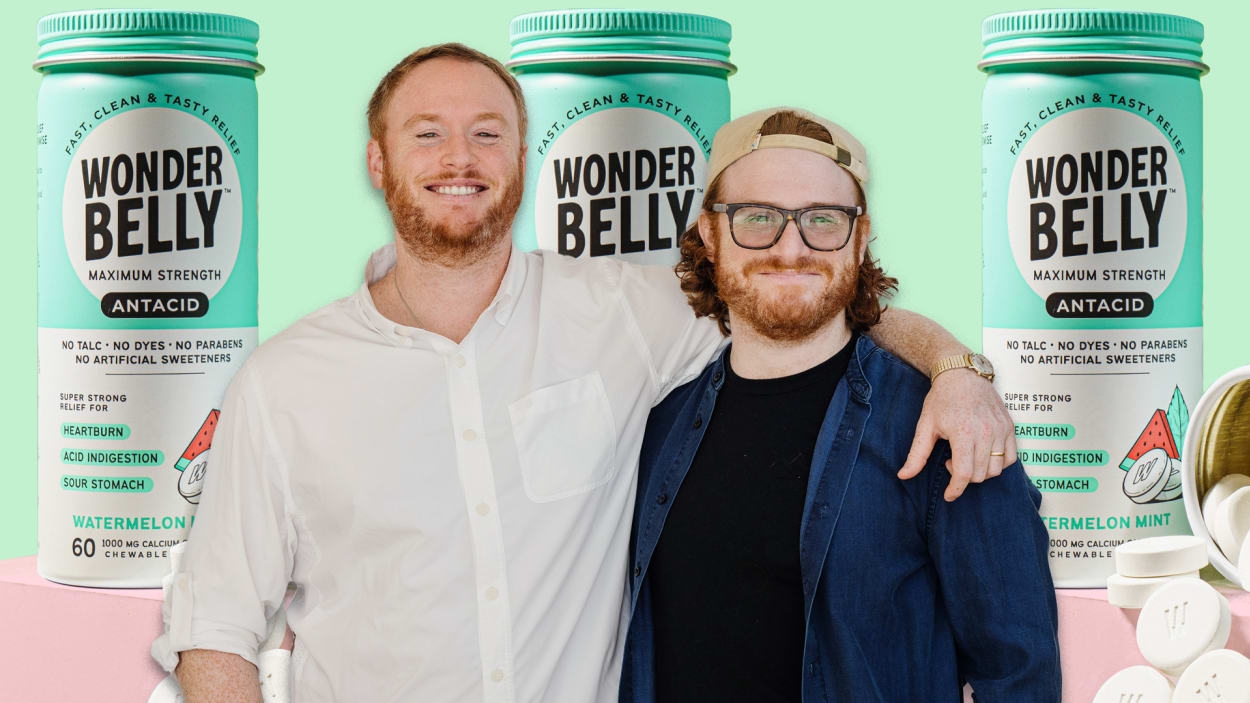These gutsy brothers want to fix your gut health—and give Tums and Pepcid heartburn
It takes a minute to find the Austin offices of Noah Kraft and Lucas Kraft, the red-headed brothers behind Wonderbelly, a new antacid heartburn reliever. They’re tucked up on the attic floor of a historic building on the city’s East Side, where startups like this one share real estate with new condos and veteran bars. Colorful rugs and a slew of Mac-topped desks dress up the low-ceilinged rooms, and evidence of late nights—a 12-cup coffee maker, a microwave, and bags of takeout—lurk in the corners. It’s exactly the kind of “before” office that the Kraft brothers might remember with nostalgia if Wonderbelly succeeds in challenging legacy brands such as Tums and Pepcid AC—and giving them indigestion.
Wonderbelly is an FDA-regulated, over-the-counter medicine and, like Tums, has one active ingredient: calcium carbonate. What differentiates Wonderbelly from competitors is its inactive ingredients, which steer clear of things like talc, dyes, and parabens found in other brands. In late March, Wonderbelly landed on the shelves of Target stores nationwide, its all-aluminum cylinders facing off with Tums and Alka-Seltzer in the drugstore aisle. The team has also developed the Wonderbelly app, launching April 12, which helps people track and manage their digestive health with tools to log meals and symptoms and identify triggers and relief options.
In a baseball cap that’s managed to tame an enviable head of hair, Lucas Kraft, 32, opens up about the motivation behind Wonderbelly: his own nine-year battle with bulimia. Although he has recovered, the disease wreaked havoc on his digestive system, and he relies on medicines to tame gastroesophageal reflux disease (GERD) on a daily basis. He gave little thought to what was in consumer-trusted brands until April 2020 when the FDA recalled the heartburn medication Zantac because of a carcinogenic ingredient, N-Nitrosodimethylamine (NDMA). In February, Bloomberg reported that Zantac knew of the cancer risk for more than 40 years but did not disclose it.
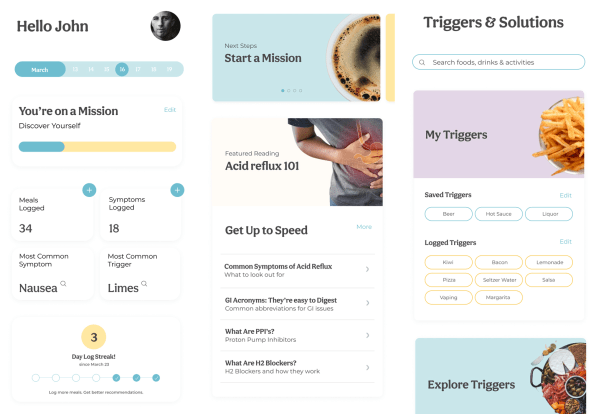
While the recall was buried in a health news cycle dominated by COVID-19, it immediately grabbed Lucas’s attention. “Here I was taking a combination of antacids and acid reducers on a daily basis, including Zantac and Tums, and I realized I had no idea what was in them,” he says, his frustration still raw despite the well-practiced sales pitch. Growing up in California, he’d never considered examining the ingredients in his medications in the same way he had become accustomed to doing so for food and household products.
Lucas teamed up with his brother Noah, 35, known in Silicon Valley circles as the founder and CEO of the now defunct Doppler Labs, which raised more than $60 million to develop smart earbuds that filtered sound. (Though Noah doesn’t suffer from chronic heartburn, his adopted passion for antacids is so infectious, you’ll consider diving into a bucket of fried chicken just to have an excuse to pop one of Wonderbelly tablets, ideally a lemon sorbet.)
The brothers delved into their own medicine cabinets and were surprised to find ingredients that were banned in the U.K., EU, and—as is the case with food additive titanium dioxide—even Petco. They put together a medical advisory board and got to work creating an effective and tasty chewable in flavors that also include strawberry milkshake and watermelon mint.
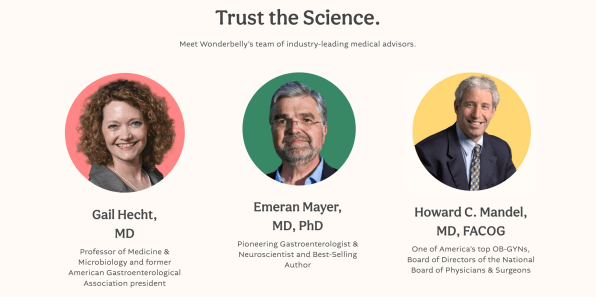
Wonderbelly’s inactive ingredients, which include such things as vegetable cellulose and sucrose sourced from non-GMO sugar cane, are all vegan, dairy free, and gluten free. Cheeky slogans like “Let’s Kick Acid” aim to attract younger customers—GERD has increased substantially in patients ages 30 to 39 over the last decade—as does the tablet’s plastic-free packaging.
It’s clear that the Kraft brothers are onto something, though how much of a bite of the country’s $2.5 billion antacid market they’ll be able to corner remains to be seen. (Tums dominates, selling more than 60 million bottles or rolls every year.)
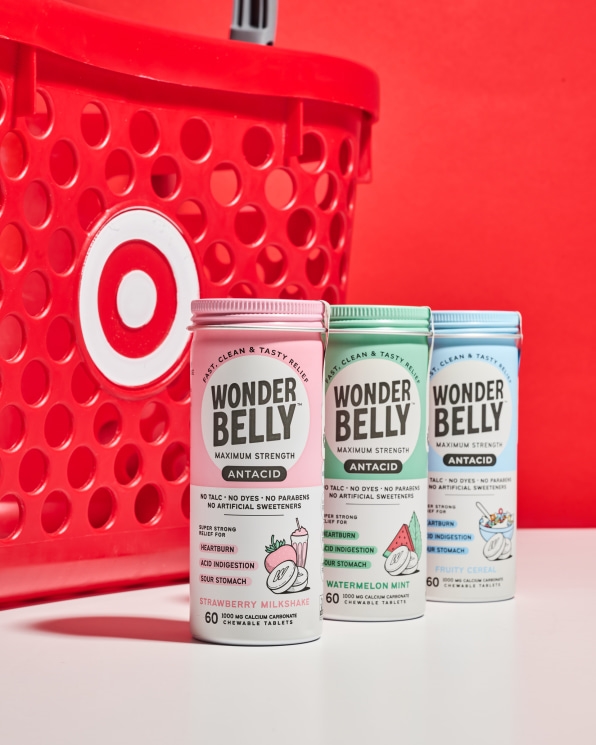
Still, Wonderbelly is resonating with investors and customers, many of which are familiar with the concept of clean ingredients thanks to similar industry shifts in haircare and cosmetics. The company has raised more than $5 million in capital from investors such as Brand Project and Slow Ventures, as well as Noah’s former Doppler cofounder and now Mindbody CEO Fritz Lanman and Magic Spoon cofounder Gabi Lewis. Wonderbelly has also become a social-media darling of such celebrities as Demi Moore and singer-songwriter Meghan Trainor.
The Kraft brothers aren’t stopping with acid reducers. They’re poised to take on more over-the-counter digestive health medicines such as multi-symptom (think Pepto-Bismol) and gas relief. “I like trying to be David to Goliath—in this case by taking on the Big Pharma industry,” Noah says.
While the new app is very much a “nights and weekends addition” to the company’s offering, it connects back to the personal mission that the brothers have when it comes to supporting people with gastrointestinal problems—what they like to call “a community of like-minded bellies”—regardless of whether they’re Wonderbelly customers. “The journey to good gut health can be difficult and super stressful,” says Lucas, as he reflects on the gratitude he feels knowing his personal story has helped people be more open about their digestive challenges. “After all, you have to eat.”
(25)

